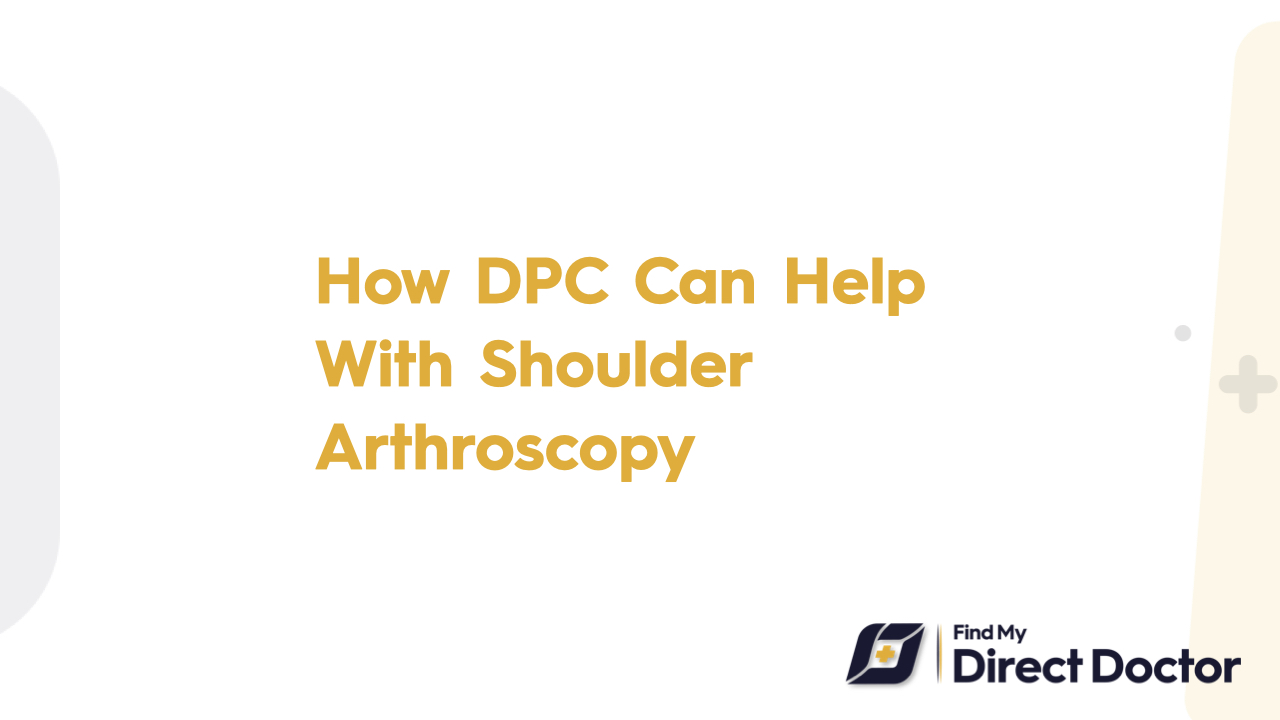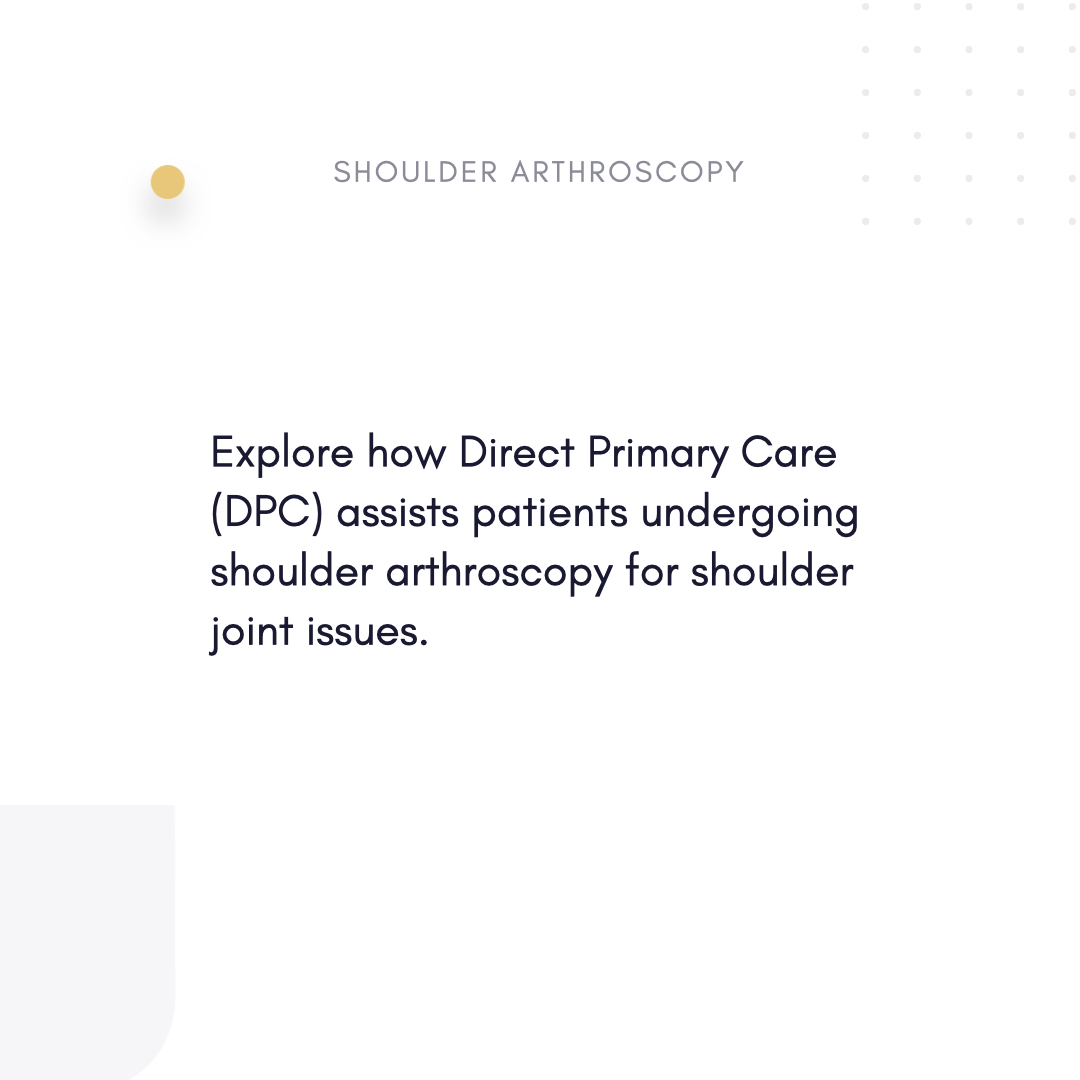Shoulder Arthroscopy and Direct Primary Care (DPC): Precision, Partnership, Faster Recovery
If you have a rotator cuff tear, impingement, or instability in your shoulder, arthroscopy can fix it. Direct primary care (DPC) makes sure that your procedure is planned, affordable, and tailored to your healing.

Understanding Shoulder Arthroscopy: A Repair That Doesn't Hurt Too Much
Shoulder arthroscopy treats:
- Tearing the rotator cuff: sewing up torn tendons.
- Labral tears: Fixing cartilage (SLAP/Bankart lesions).
- Bursitis/impingement: Getting rid of tissue that is swollen.
Important facts:
- Safety: Less chance of infection than open surgery; 90% success rate for rotator cuff repair.
- DPC memberships (100–350 USD/month) pay for pre-op exams and follow-ups, which is different from traditional fees (5,000–15,000 USD/surgery).
Risks of waiting:
- Muscle wasting and a frozen shoulder.
How DPC Improves the Results of Arthroscopy
Direct Primary Care (DPC) improves shoulder care by making sure that everything works together and putting the patient first.
Complete Before Surgery Prep
- Quick tests: Make an appointment for an MRI or ultrasound within 48 hours.
- Programs for prehab: Strengthen the muscles around the scapula to help with recovery.
- Managing medication: Change blood thinners or NSAIDs before surgery.
Clear pricing and all-around help
- Care that includes everything: Membership includes referrals to surgeons, coordination of physical therapy, and medications after surgery.
- Savings on costs: Self-pay DPC rates can save you 25–45% on facility fees.
- Focus on mental health: Deal with worries about losing mobility or having surgery.
Personalized Recovery and Health for the Long Term
- Access 24 hours a day, 7 days a week: If you have sudden pain or fever after surgery, call your doctor right away.
- Virtual PT: Help people do early passive motion exercises over the phone.
- To keep track of progress, check the range of motion at 2, 6, and 12 weeks.
Advantages of DPC for Patients Undergoing Arthroscopy
- No waiting times: 85% of DPC patients schedule surgery within two weeks, compared to the usual six weeks or more.
- Continuity: One team is in charge of using the sling, controlling pain, and following through with physical therapy.
- No extra costs: Prices that are clear (for example, 8,500 USD for rotator cuff repair).
True Stories of Success
- Case 1: Lisa, 50, has a full-thickness tear in her rotator cuff. Lisa's DPC team did an arthroscopic repair, and she got back 90% of her strength in six months.
- Case 2: Jake, 28, who keeps dislocating his shoulder. Jake's DPC provider fixed his labrum, and he hasn't had any dislocations in the two years since the surgery.
Shoulder arthroscopy in DPC: Frequently Asked Questions
- Q: How long does it take to get better?
- A: You will need to wear a sling for 4 to 6 weeks, and your full strength will come back in 6 to 12 months.
- Q: After surgery, can I drive?
- A: Not for 4–6 weeks; DPC will help you find a ride if you need one.
- Q: Do I need PT?
- A: Yes, three times a week for three months. DPC works with local therapists.
- Q: What happens if the repair doesn't work?
- A: DPC looks into revision surgery or therapies that help the body heal itself.
Why DPC is the best place for orthopedic care
The American Academy of Orthopaedic Surgeons (AAOS) stresses the importance of getting ready for surgery. DPC gets things done by:
- Prehab cuts the rate of frozen shoulder by 30%, which lowers the risk of complications.
- Increasing adherence: 90% of DPC patients finish PT, while only 65% of patients in the U.S. do.
- Saving money: Members save between 3,000 USD and 10,000 USD by using bundled pricing.
Final Thoughts
Shoulder arthroscopy in DPC isn't just about fixing tears; it's also about working with a team that cares about your active lifestyle. With DPC, you can avoid insurance delays, see the best surgeons, and get a recovery plan that works for you. From getting ready for surgery to throwing again, get care that flows as easily as your shoulder.






